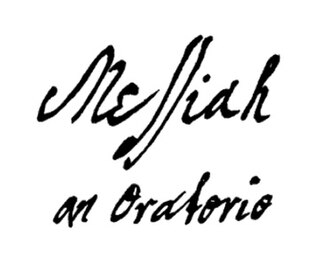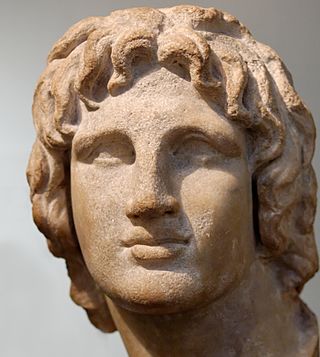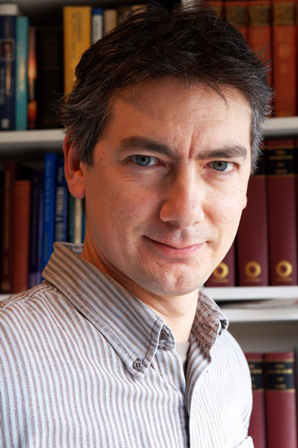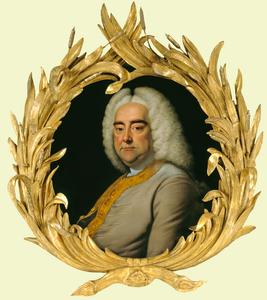Related Research Articles

George FridericHandel was a German-British Baroque composer well known for his operas, oratorios, anthems, concerti grossi, and organ concertos. Handel received his training in Halle and worked as a composer in Hamburg and Italy before settling in London in 1712, where he spent the bulk of his career and became a naturalised British subject in 1727. He was strongly influenced both by the middle-German polyphonic choral tradition and by composers of the Italian Baroque. In turn, Handel's music forms one of the peaks of the "high baroque" style, bringing Italian opera to its highest development, creating the genres of English oratorio and organ concerto, and introducing a new style into English church music. He is consistently recognized as one of the greatest composers of his age.

Messiah is an English-language oratorio composed in 1741 by George Frideric Handel. The text was compiled from the King James Bible and the Coverdale Psalter by Charles Jennens. It was first performed in Dublin on 13 April 1742 and received its London premiere nearly a year later. After an initially modest public reception, the oratorio gained in popularity, eventually becoming one of the best-known and most frequently performed choral works in Western music.

James Harris, FRS was an English politician and grammarian. He was the author of Hermes, a philosophical inquiry concerning universal grammar (1751).

Alessandro, is an opera composed by George Frideric Handel in 1726 for the Royal Academy of Music. Paolo Rolli's libretto is based on the story of Ortensio Mauro's La superbia d'Alessandro. This was the first time the famous singers Faustina Bordoni and Francesca Cuzzoni appeared together in one of Handel's operas. The original cast also included Francesco Bernardi who was known as Senesino.

Saul is a dramatic oratorio in three acts written by George Frideric Handel with a libretto by Charles Jennens. Taken from the First Book of Samuel, the story of Saul focuses on the first king of Israel's relationship with his eventual successor, David—one which turns from admiration to envy and hatred, ultimately leading to the downfall of the eponymous monarch. The work, which Handel composed in 1738, includes the famous "Dead March", a funeral anthem for Saul and his son Jonathan, and some of the composer's most dramatic choral pieces. Saul was first performed at the King's Theatre in London on 16 January 1739. The work was a success at its London premiere and was revived by Handel in subsequent seasons. Notable modern-day performances of Saul include that at Glyndebourne in 2015.

Soli Deo gloria is a Latin term for Glory to God alone. It has been used by artists like Johann Sebastian Bach, George Frideric Handel, and Christoph Graupner to signify that the work was produced for the sake of praising God. The phrase has become one of the five solae propounded to summarise the Reformers' basic beliefs during the Protestant Reformation.
Events from the year 1741 in Ireland.
Donald Charles Peter Mitchell CBE was a British writer on music, particularly known for his books on Gustav Mahler and Benjamin Britten and for the book The Language of Modern Music, published in 1963.

Duncan Wu is a British academic and biographer.

Ero e Leandro, also known after its first line as Qual ti reveggio, oh Dio, is a 1707 Italian-language cantata by George Frideric Handel, composed during his stay in Rome to a libretto believed to be written by Cardinal Pietro Ottoboni. It is a reworking of the Greek myth of Hero and Leander, with the soprano soloist taking the role of Hero. In it, Hero finds her love, Leander, drowned, tears out her hair, thus symbolically rejecting the beauty which had led to Leander's fascination with her, then drowns herself. It is composed for a soprano solo, and a small orchestra consisting of two oboes, and two string sections: a concertino of solo violin and violoncello, and a concerto grosso made up of two violins, a viola, and continuo. In Ero e Leandro, Recitatives alternate with arias, as was normal at the period for not only cantatas, but oratorios and operas as well; however, unusually, Ero e Leandro ends with a recitative, instead of an aria.

The Handel organ concertos, Op. 4, HWV 289–294, are six organ concertos for chamber organ and orchestra composed by George Frideric Handel in London between 1735 and 1736 and published in 1738 by the printing company of John Walsh. Written as interludes in performances of oratorios in Covent Garden, they were the first works of their kind for this combination of instruments and served as a model for later composers.

The Handel organ concertos, Op. 7, HWV 306–311, refer to the six organ concertos for organ and orchestra composed by George Frideric Handel in London between 1740 and 1751, published posthumously in 1761 by the printing company of John Walsh. They were written for performance during Handel's oratorios, contain almost entirely original material, including some of his most popular and inspired movements.
A fine and delicate touch, a volant finger, and a ready delivery of passages the most difficult, are the praise of inferior artists: they were not noticed in Handel, whose excellencies were of a far superior kind; and his amazing command of the instrument, the fullness of his harmony, the grandeur and dignity of his style, the copiousness of his imagination, and the fertility of his invention were qualities that absorbed every inferior attainment. When he gave a concerto, his method in general was to introduce it with a voluntary movement on the diapasons, which stole on the ear in a slow and solemn progression; the harmony close wrought, and as full as could possibly be expressed; the passages concatenated with stupendous art, the whole at the same time being perfectly intelligible, and carrying the appearance of great simplicity. This kind of prelude was succeeded by the concerto itself, which he executed with a degree of spirit and firmness that no one ever pretended to equal.

John Mainwaring was an English theologian and the first biographer of the composer Georg Friedrich Händel in any language. He was a Fellow of St. John's College, Cambridge, and parish priest, and later a professor of Divinity at Cambridge.
Rev. Anselm Bayly was an English churchman and author of various works, chiefly of a theological and critical nature. He was also a singer and musical theorist, associated with the performance of works by George Frideric Handel.
Markus Bockmuehl is a biblical scholar specialising in Early Christianity. He has been the Dean Ireland's Professor of the Exegesis of Holy Scripture at the University of Oxford since 2014, and a Fellow of Keble College, Oxford, since 2007.

The Wedding anthem for Princess Anne, HWV 262, This is the day which the Lord hath made, is an anthem for vocal soloists, chorus and orchestra by George Frideric Handel. It was written for the wedding of Anne, Princess Royal and Prince William of Orange and was first performed during their marriage at the French Chapel in St James's Palace, London, on 14 March 1734. The music is set to English texts chosen from the biblical books of Psalms, Proverbs and Ecclesiasticus.

In 1703, the 18-year-old composer George Frideric Handel took up residence in Hamburg, Germany, where he remained until 1706. During this period he composed four operas, only the first of which, Almira, has survived more or less intact. Of the other three, the music for Nero is lost, while only short orchestral excerpts from Florindo and Daphne survive.

"Va tacito e nascosto" is an aria written for alto castrato voice in act 1 of George Frideric Handel's opera Giulio Cesare in Egitto, composed in 1724 to a libretto by Nicola Francesco Haym. Sung by the character Julius Caesar, it features extensive solos for natural horn.
Elizabeth Eva Leach is a British musicologist and music theorist who specializes in medieval music, especially that of the fourteenth century. Much of her scholarship concerns the life and work of Guillaume de Machaut.

The Foundling Hospital Anthem, also known by its longer title "Blessed are they that considereth the poor" [sic], is a choral anthem composed by George Frideric Handel in 1749. It was written for the Foundling Hospital in London and was first performed in the chapel there. Handel wrote two versions, one for choir only and one for choir and soloists. Composed 10 years before his death, it was Handel's last piece of English church music.
References
- ↑ "Library of Congress authorities" . Retrieved 31 August 2010.
- ↑ OU Department of Music: Professor Donald Burrows
- ↑ "'Music & Letters' Awards and Authors of Articles in This Issue". Music and Letters. 86 (4): 689. 1 November 2005. doi:10.1093/ml/gci138. Project MUSE 190301.
- ↑ "Handelian FAQs". Gfhandel.org. Archived from the original on 21 March 2009. Retrieved 1 September 2010.